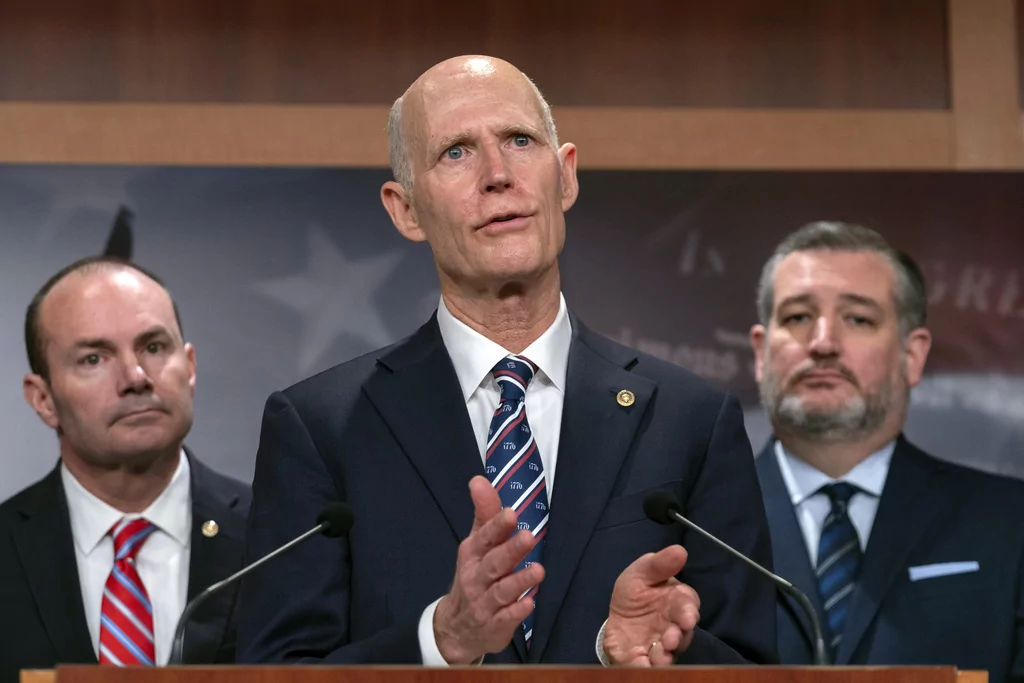
National Democrats are mulling whether they have cash and time to go all in against GOP-held Senate seats in Texas and Florida with one month out to the election.
With signs that Sen. Jon Tester’s (D-MT) seat is slipping away in a race that could deliver the chamber majority to Republicans, Democrats have only just recently gone on offense with last-minute, modest ad-buys against Sens. Ted Cruz (R-TX) and Rick Scott (R-FL).
But they’ll likely need to pony up millions of dollars more in campaign ads in the final month if they want to buoy their Democratic underdog challengers across the finish line.
“Given the fact that the Democrats are in great danger of losing the Senate, I think you got to gamble,” Democratic strategist Brad Bannon said. “I think you’ve got to pull out all stops and go into those states, even if that means pulling back some money in some of the other battleground states.”
In Texas, Cruz faces Rep. Colin Allred (D-TX). In Florida, Scott is up against former Rep. Debbie Mucarsel-Powell (D-FL). Polls and predictions from nonpartisan election forecasters suggest both races are tightening for seats that many Democrats once privately felt were out of play.
Sen. Gary Peters (D-MI), chairman of the Democratic Senate Committee Campaign, who’s tasked with keeping the majority, declined to reveal Friday whether the national party would commit additional resources beyond its already announced “multimillion-dollar” endeavor.
“Our challengers are running against unpopular Republican incumbents who have very weak polling,” Peters said. “We’ve got momentum. The more resources we’re able to marshal to put into Florida and Texas, I believe we have a real shot to win those as well.”

The DSCC has placed more than $54 million in ad reservations this year across more than a half-dozen battleground states that the party must defend to keep the majority.
With Democrats playing defense in Michigan, Pennsylvania, Wisconsin, Montana, Nevada, Arizona, and Ohio, there are few options to go on offense against sitting Republicans.
Bannon said Democrats should consider pumping money into Florida and Texas to avoid “oversaturating” voters in swing states who are already being bombarded with presidential ads. He cited the Maryland Senate race between former Gov. Larry Hogan (R-MD) and Prince George’s County Angela Alsobrooks (D) as another example of misplaced money, where Democratic PACs, including one tied to Senate Majority Leader Chuck Schumer (D-NY), recently dumped more than a million dollars.
“I think you can spend too much in a state,” Bannon said. “Any extra dollar you spend in those [swing] states is not cost-effective.”
Texas and Florida are both big states and with big states come big media markets with big price tags. Democrats are within striking distance, but they know their money won’t go as far as elsewhere in the country.
Allred has closed his deficit to Cruz to an average of roughly three points. Mucarsel-Powell’s race against Scott has similarly tightened to about three points behind the incumbent.
The nonpartisan Cook Political Report has shifted Cruz’s seat to the more competitive category “lean Republican,” one step shy of a “toss-up.” Scott’s race is considered safer as “likely Republican.”
CLICK HERE TO READ MORE FROM THE WASHINGTON EXAMINER
The Cook Political Report‘s Political Senate and Governors editor, Jessica Taylor, laid out the case that the politically savvy move for Democrats would be to stick with one: Texas.
“[I]t’s hard to see Democrats being able to go all-in on both given the amount of defense they have to play,” she recently wrote. “Taking a comprehensive look at both races, we view Texas as at least slightly more competitive, as do both parties privately. We’ve seen tightening polling in both, but it’s Texas that meets the bar to move into a more competitive category.”





